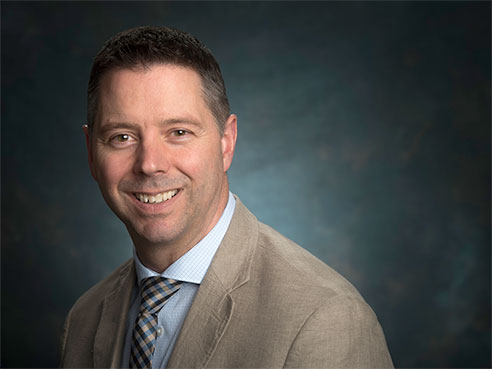 Greg Kennedy, M.D., an internationally recognized surgeon and researcher, has been named director of the Division of Gastrointestinal Surgery in the University of Alabama at Birmingham School of Medicine.
Greg Kennedy, M.D., an internationally recognized surgeon and researcher, has been named director of the Division of Gastrointestinal Surgery in the University of Alabama at Birmingham School of Medicine.
Kennedy comes to UAB from the University of Wisconsin School of Medicine and Public Health. He officially joined UAB on April 1.
“Dr. Kennedy is a topnotch colorectal surgeon who will bring tremendous leadership, direction and academic research to our department,” said Herbert Chen, M.D., chair of the Department of Surgery. “Our GI patients will benefit from the quality of care he can provide, and our faculty and staff will strengthen even more with the clinical, academic and research expertise he will bring with him. We are excited to add a surgeon of Dr. Kennedy’s caliber to our institution.”
UAB GI surgeons provide care for patients with routine and complex gastrointestinal surgical problems. The group consists of 10 surgeons with advanced training and expertise in surgical management of all aspects of gastrointestinal diseases, including cancer and benign conditions.
The group offers minimally invasive approaches for most surgically treated gastrointestinal diseases, including robotic surgery and single-incision laparoscopic surgery for certain diseases. The Division of GI Surgery also offers unique expertise in pancreatic islet cell transplantation for chronic pancreatitis and is the only program in the Southeast to do so.
“This division is one of the most talented divisions of GI surgeons as a group in the United States,” Kennedy said. “Our goal will be to be the premier GI division in the country, setting the standard for GI surgery. When people think of training programs for GI surgery and what a GI surgery division should look like, we want them to look at UAB as the model. That means we’re going to be providing high-value clinical care to the sickest patients in the South. We’re going to publish papers about that work and advance the science around GI surgery, whether in diabetes research, in cancer chemoprevention, in health services or in health equity-type research, we’re going to be doing it.”
| The group offers minimally invasive approaches for most surgically treated gastrointestinal diseases, including robotic surgery and single-incision laparoscopic surgery for certain diseases. The Division of GI Surgery also offers unique expertise in pancreatic islet cell transplantation for chronic pancreatitis and is the only program in the Southeast to do so. |
Kennedy was born and raised in Montana and is a graduate of the University of Washington School of Medicine in Seattle. He earned his doctorate in cancer biology at the University of Wisconsin School of Medicine and Public Health, where he also completed his general surgery residency in 2006. Kennedy then completed his colon and rectal surgery fellowship at the Mayo Clinic in Rochester, Minn., in 2007.
Kennedy is certified by the American Board of Colon and Rectal Surgery and by the American Board of Surgery. In addition, he is a fellow of the American College of Surgeons and a fellow of the American Society of Colon and Rectal Surgery. Kennedy’s main interest is in laparoscopic approaches to complex colorectal disease. He has experience with all advanced laparoscopic and minimally invasive approaches, including single-incision laparoscopy and robotic surgery. His clinical areas of expertise include colon cancer, rectal cancer, inflammatory bowel disease, benign conditions of colon, rectum and anus, and endoscopic treatment of colonic disease.
“I love taking care of my patients, and I love the operations and helping people regain a higher quality of life,” Kennedy said. “Cancer patients and patients with benign disease are so grateful. Patients with ulcerative colitis or Crohn’s disease and illnesses that have been dragging them down for years in some instances — to see their lives changed and quality of life get better is just unbelievable. It’s great to have a patient tell you the day after they have surgery for ulcerative colitis that they already feel better.”
Kennedy’s research efforts are focused on chemoprevention of colon and rectal cancer. His funded laboratory uses genetic models to better understand how chemicals prevent tumor formation and what genetic pathways are responsible for their effects. The ultimate goal is to identify targeted agents that are better tolerated by patients in hopes of preventing colon and rectal cancer.
Kennedy says the opportunity to work with the great surgeons, researchers and educational team in the Division of GI Surgery will enable the group to lay a foundation of knowledge that he hopes will be well-known throughout the Southeast and beyond.
“We’re going to be changing the way we educate the residents of our communities, and I want us to think about how we are going to educate the physicians out in the community so that they are providing the same high-quality care that we are here at UAB,” Kennedy said. “We want the residents of Alabama, Mississippi, Georgia — wherever they are — if there is some kind of UAB influence on their programs, we want those residents to know they are getting the same quality of care they would get here in Birmingham.”